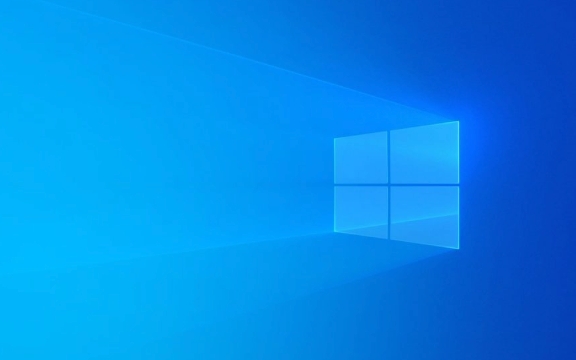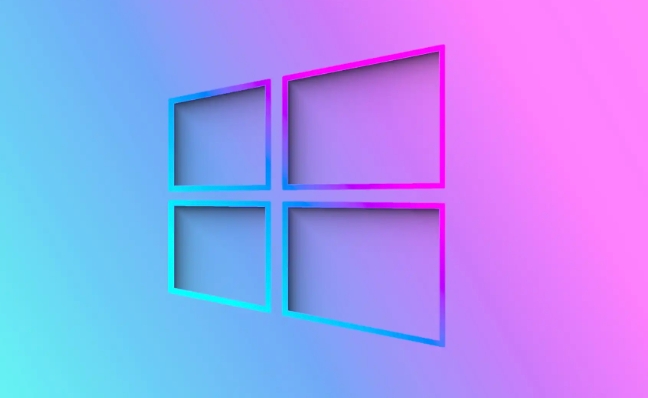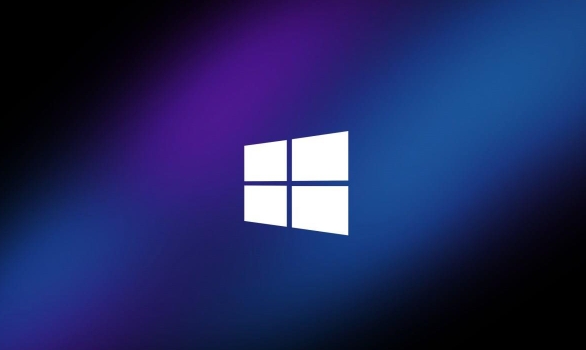 Computer Tutorials
Computer Tutorials
 Troubleshooting
Troubleshooting
 What causes the DPC_WATCHDOG_VIOLATION blue screen error in Windows 10/11, and how can I fix it?
What causes the DPC_WATCHDOG_VIOLATION blue screen error in Windows 10/11, and how can I fix it?
What causes the DPC_WATCHDOG_VIOLATION blue screen error in Windows 10/11, and how can I fix it?
Jul 21, 2025 am 12:43 AMDPC_WATCHDOG_VIOLATION Blue screen errors are mainly caused by driver or hardware problems. The core reason is that a driver handles interrupt requests for too long, which causes the system to force blue screen protection. Common triggers include: 1. Outdated, incompatible or damaged drivers; 2. Third-party security software conflicts; 3. Abnormal hard disk or SSD controller; 4. Improper BIOS settings or firmware problems; 5. Hardware failures such as storage devices or motherboards. The repair methods are: 1. Update or rollback the key device drivers; 2. Check the disk status and fix the errors; 3. Uninstall or disable third-party security software; 4. Adjust the BIOS and power management settings; If the above steps are invalid, hardware problems need to be checked, such as replacing the hard disk or detecting the memory and motherboard status. In most cases, it can be resolved by updating the driver or uninstalling the conflict software.

DPC_WATCHDOG_VIOLATION is one of the common blue screen errors in Windows 10/11 and usually occurs when the system detects that the delayed procedure call (DPC) is running for too long. This problem is often related to drivers or hardware and is not particularly rare, but if not handled, it may occur repeatedly and affect the user experience.

Why does the DPC_WATCHDOG_VIOLATION error appear?
The core reason for this error is that a driver takes too much time when processing an interrupt request, causing the system to think it is "stuck". Common reasons include:
- Outdated, incompatible or damaged drivers
- Third-party antivirus software or firewall conflict
- Hard disk or SSD controller driver abnormality
- Improper BIOS settings or firmware issues
- Hardware failure, especially storage device or motherboard problems
The Windows DPC mechanism is to ensure the timely response of the system. Once a task is delayed for too long, the protection mechanism will be triggered to force a blue screen.

How to fix DPC_WATCHDOG_VIOLATION blue screen?
1. Update or rollback the driver
This is the most common solution. Especially the drivers of key equipment such as storage controllers, graphics cards, network cards, etc.
- Open Device Manager → Find the relevant hardware devices (such as IDE ATA/ATAPI controller, display adapter)
- Right-click → select "Update Driver" or "Rolleate Driver"
- Pay special attention to whether the NVMe or SATA controller driver is the latest version
If you are not sure which driver is the problem, you can try using third-party driver update tools (such as Driver Booster), but it is recommended to obtain drivers through the official website first.

2. Check whether the hard drive or SSD is normal
Since this error is often related to storage devices, it is recommended to check the disk health status:
- Use CrystalDiskInfo to view the health status of the hard drive
- If it is an SSD, check if there is a firmware update
- Run
chkdsk /f /rcheck in command prompt and fix disk errors
Certain SSD models (such as Samsung, Intel older models) have reported firmware issues related to this error.
3. Disable or uninstall third-party security software
Some third-party antivirus software or firewalls will deeply intervene in the underlying system operations, which may lead to conflicts.
- Temporarily close or uninstall the security software you installed (such as McAfee, Kaspersky, Avast, etc.)
- Observe whether there is still a blue screen phenomenon
If you have just installed the security software and the blue screen appears, it is most likely that it is caused.
4. Check BIOS settings and power management options
Some energy-saving settings in the BIOS may affect the stability of the device driver:
- After entering the BIOS, set SATA mode to AHCI (if not)
- Turn off C States or other energy-saving options
- Update the motherboard BIOS to the latest version
In addition, disabling "Allow the computer to turn off this device to save power" in power management may also help.
When do you need to consider hardware issues?
If you've tried all of the above methods and still don't work, that's probably a hardware issue:
- Replace the hard drive and see if there is still an error
- Check if the memory stick is plugged in, or use the Windows Memory Diagnostic Tool to test it
- The aging of the motherboard capacitor or the South Bridge chip problem may also cause such blue screens
In this case, it is recommended to contact after-sales service or professionals for further investigation.
Basically, these common causes and solutions are all about them. Although it seems a bit too much, most of the time you can do it by updating the driver or uninstalling the security software. Don’t panic when encountering a blue screen. Follow the steps to check it out. In most cases, you can find the root cause.
The above is the detailed content of What causes the DPC_WATCHDOG_VIOLATION blue screen error in Windows 10/11, and how can I fix it?. For more information, please follow other related articles on the PHP Chinese website!

Hot AI Tools

Undress AI Tool
Undress images for free

Undresser.AI Undress
AI-powered app for creating realistic nude photos

AI Clothes Remover
Online AI tool for removing clothes from photos.

Clothoff.io
AI clothes remover

Video Face Swap
Swap faces in any video effortlessly with our completely free AI face swap tool!

Hot Article

Hot Tools

Notepad++7.3.1
Easy-to-use and free code editor

SublimeText3 Chinese version
Chinese version, very easy to use

Zend Studio 13.0.1
Powerful PHP integrated development environment

Dreamweaver CS6
Visual web development tools

SublimeText3 Mac version
God-level code editing software (SublimeText3)

Hot Topics
 Windows Security is blank or not showing options
Jul 07, 2025 am 02:40 AM
Windows Security is blank or not showing options
Jul 07, 2025 am 02:40 AM
When the Windows Security Center is blank or the function is missing, you can follow the following steps to check: 1. Confirm whether the system version supports full functions, some functions of the Home Edition are limited, and the Professional Edition and above are more complete; 2. Restart the SecurityHealthService service to ensure that its startup type is set to automatic; 3. Check and uninstall third-party security software that may conflict; 4. Run the sfc/scannow and DISM commands to repair system files; 5. Try to reset or reinstall the Windows Security Center application, and contact Microsoft support if necessary.
 PEAK Voice Chat Not Working on PC: Check This Stepwise Guide!
Jul 03, 2025 pm 06:02 PM
PEAK Voice Chat Not Working on PC: Check This Stepwise Guide!
Jul 03, 2025 pm 06:02 PM
Players have been experiencing the PEAK voice chat not working issue on PC, impacting their cooperation during climbs. If you are in the same situation, you can read this post from MiniTool to learn how to resolve PEAK voice chat issues.Quick Navigat
 Windows stuck on 'undoing changes made to your computer'
Jul 05, 2025 am 02:51 AM
Windows stuck on 'undoing changes made to your computer'
Jul 05, 2025 am 02:51 AM
The computer is stuck in the "Undo Changes made to the computer" interface, which is a common problem after the Windows update fails. It is usually caused by the stuck rollback process and cannot enter the system normally. 1. First of all, you should wait patiently for a long enough time, especially after restarting, it may take more than 30 minutes to complete the rollback, and observe the hard disk light to determine whether it is still running. 2. If there is no progress for a long time, you can force shut down and enter the recovery environment (WinRE) multiple times, and try to start repair or system restore. 3. After entering safe mode, you can uninstall the most recent update records through the control panel. 4. Use the command prompt to execute the bootrec command in the recovery environment to repair the boot file, or run sfc/scannow to check the system file. 5. The last method is to use the "Reset this computer" function
 Proven Ways for Microsoft Teams Error 657rx in Windows 11/10
Jul 07, 2025 pm 12:25 PM
Proven Ways for Microsoft Teams Error 657rx in Windows 11/10
Jul 07, 2025 pm 12:25 PM
Encountering something went wrong 657rx can be frustrating when you log in to Microsoft Teams or Outlook. In this article on MiniTool, we will explore how to fix the Outlook/Microsoft Teams error 657rx so you can get your workflow back on track.Quick
 The RPC server is unavailable Windows
Jul 06, 2025 am 12:07 AM
The RPC server is unavailable Windows
Jul 06, 2025 am 12:07 AM
When encountering the "RPCserverisunavailable" problem, first confirm whether it is a local service exception or a network configuration problem. 1. Check and start the RPC service to ensure that its startup type is automatic. If it cannot be started, check the event log; 2. Check the network connection and firewall settings, test the firewall to turn off the firewall, check DNS resolution and network connectivity; 3. Run the sfc/scannow and DISM commands to repair the system files; 4. Check the group policy and domain controller status in the domain environment, and contact the IT department to assist in the processing. Gradually check it in sequence to locate and solve the problem.
 The requested operation requires elevation Windows
Jul 04, 2025 am 02:58 AM
The requested operation requires elevation Windows
Jul 04, 2025 am 02:58 AM
When you encounter the prompt "This operation requires escalation of permissions", it means that you need administrator permissions to continue. Solutions include: 1. Right-click the "Run as Administrator" program or set the shortcut to always run as an administrator; 2. Check whether the current account is an administrator account, if not, switch or request administrator assistance; 3. Use administrator permissions to open a command prompt or PowerShell to execute relevant commands; 4. Bypass the restrictions by obtaining file ownership or modifying the registry when necessary, but such operations need to be cautious and fully understand the risks. Confirm permission identity and try the above methods usually solve the problem.
 the default gateway is not available Windows
Jul 08, 2025 am 02:21 AM
the default gateway is not available Windows
Jul 08, 2025 am 02:21 AM
When you encounter the "DefaultGatewayisNotAvailable" prompt, it means that the computer cannot connect to the router or does not obtain the network address correctly. 1. First, restart the router and computer, wait for the router to fully start before trying to connect; 2. Check whether the IP address is set to automatically obtain, enter the network attribute to ensure that "Automatically obtain IP address" and "Automatically obtain DNS server address" are selected; 3. Run ipconfig/release and ipconfig/renew through the command prompt to release and re-acquire the IP address, and execute the netsh command to reset the network components if necessary; 4. Check the wireless network card driver, update or reinstall the driver to ensure that it works normally.
 How to fix 'SYSTEM_SERVICE_EXCEPTION' stop code in Windows
Jul 09, 2025 am 02:56 AM
How to fix 'SYSTEM_SERVICE_EXCEPTION' stop code in Windows
Jul 09, 2025 am 02:56 AM
When encountering the "SYSTEM_SERVICE_EXCEPTION" blue screen error, you do not need to reinstall the system or replace the hardware immediately. You can follow the following steps to check: 1. Update or roll back hardware drivers such as graphics cards, especially recently updated drivers; 2. Uninstall third-party antivirus software or system tools, and use WindowsDefender or well-known brand products to replace them; 3. Run sfc/scannow and DISM commands as administrator to repair system files; 4. Check memory problems, restore the default frequency and re-plug and unplug the memory stick, and use Windows memory diagnostic tools to detect. In most cases, the driver and software problems can be solved first.





